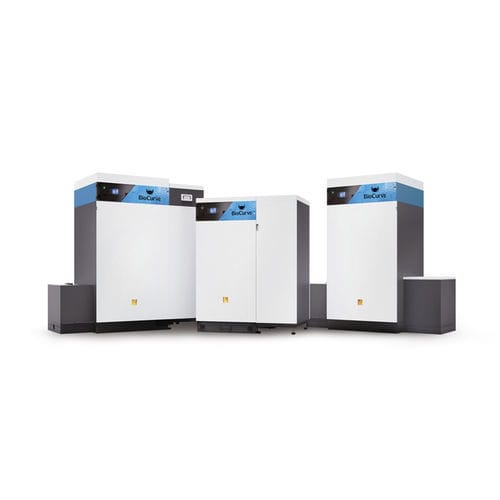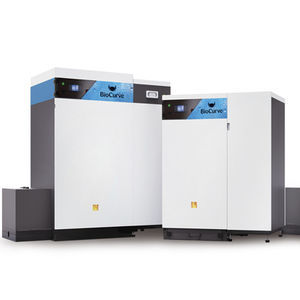
Hot water boiler BCH150biomasspelletcondensing
Add to favorites
Compare this product
Characteristics
- Product
- hot water
- Power source
- biomass, pellet
- Other characteristics
- condensing, compact
- Power
Max.: 150 kW
Min.: 45 kW
- Pressure
5 bar
(72.52 psi)- Empty weight
690 kg
(1,521.2 lb)
Description
Pellet boilers with condensing system for your public buildings and large spaces
We all want the best for the next generations. And each one can contribute their grain of sand, starting with the town in which they live. BioCurve boilers, certified in the most demanding European laboratories, help limit CO2 emissions into the atmosphere, while allowing savings in energy management.
Our equipment is prepared for heating municipal buildings, whether they are schools, residences, town halls, swimming pools or even heat networks, distributing the energy generated to various buildings.
As they are compact boilers, and with the capacity to work several pieces of equipment simultaneously, considerable thermal powers can be achieved in very small spaces.
Furthermore, the energy units include a single boiler, silo and hydraulic unit, verified from the factory, favoring rapid installation and start-up, with hardly any civil works. Given their small size, these energy units can become portable, to temporarily heat venues in the event of events.
BioCurve carries out responsible management in all its areas, as accredited by its Corporate Social Responsibility seal.
With BioCurve, profitability is not at odds with sustainability.
Prestigious independent laboratories have certified the only complete range with an A++ energy label
Catalogs
No catalogs are available for this product.
See all of BioCurve‘s catalogs*Prices are pre-tax. They exclude delivery charges and customs duties and do not include additional charges for installation or activation options. Prices are indicative only and may vary by country, with changes to the cost of raw materials and exchange rates.





